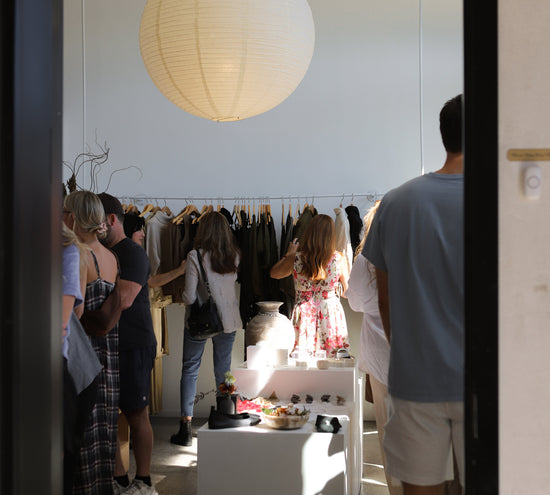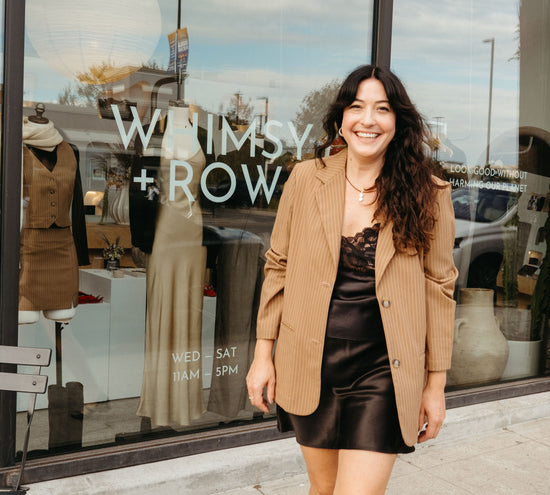Social Justice and Sustainability

Graphic by Leah Thomas of @greengirlleah
We’ve found ourselves in a moment of long-awaited awakening: white people are finally acknowledging and reckoning with systemic racism. While the new groundswell of support for the Black Lives Matter movement was triggered by police brutality, it has forced every industry to confront the racial inequities baked into their structures. Least of which is fashion. The industry at large has a deeply racist history, although sustainable fashion has its own tale of appropriation and inequality. In order to create a more sustainable and just future, this community will have to come together in ways it never has before.
A Bit of Context
Practices associated with sustainability have been around for centuries, though weren’t packaged together with a shiny bow until about the 1980s. Sustainability is not a new concept, it’s something which has been deeply ingrained in communities of color and white people are just now grasping it. “Sustainability is Blackness. Sustainability is Indigenous. But today sustainability has become a trendy buzz word to make people feel better about themselves — propaganda if you will,” Dominique Drakeford the founder of MelaninASS and cofounder of Sustainable Brooklyn told i-D. It’s vital that we recognize quality craftsmanship, mending, and living in harmony with nature as practices which have always been inherent in BIPOC (Black, Indigenous, and People of Color) communities in order to avoid the appropriation and exploitation which so often occurs in fashion. In a piece for EcoAge, writer and activist Aja Barber explained that, “everything from the food we consume to the way we dress ourselves is entwined with a system of oppression off the backs of those with less and mostly people of colour.” For this reason, journalist, advocate, and entrepreneur Celine Semaan consistently highlights the connection between colonization and sustainability in her work. No one can change the industry for good without reckoning with its controversial past.
Intersectional Sustainability
So how do we move forward? We make sustainability intersectional. Intersectionality is a way of observing and analysing power imbalances that takes into account all the various aspects of a person, society, and system. For example, environmentalist Leah Thomas has wrestled with the concept of “environmental justice” since her second year of college, when she realized that the efforts towards a cleaner, better environment were leaving out low income communities altogether. In a recent piece for The Good Trade she said “As my textbooks encouraged me to protect public lands so they could be preserved and enjoyed, I couldn’t help but wonder, ‘for whom?’” Sustainable fashion, and the sustainability movement in general, must ask this same question. Who is this product, this business model, this movement, created for? Sustainable fashion must progress from a movement benefitting only a specific privileged group, to one which includes all individuals. We cannot change the toxic fashion system without a diverse range of voices.
Diversify Your Feed
In the same EcoAge piece, Aja Barber suggests a great place to start making sustainability intersectional, is on social media. Aside from experts Dominique Drakeford, Celine Semaan, Leah Thomas, and Aja Barber herself, referenced above, here are 6 women of color to start diversifying your sustainability feed:
Akilah Hughes is the founder of Fatra, an upcycled handbag brand. Named after the Haitian kreyol word for “trash,” she takes plastic containers which would otherwise be discarded and turns them into statement pieces. Along with her handmade bags, Akilah hosts workshops and tips for mending instead of discarding on her page.

Tyler Chanel is the mastermind behind Thrifts and Tangles, an ethical blog focused on secondhand style and sustainability. Along with being an ethical fashion model, the LA resident shares her thrifted finds and encourages all her followers to be a little more resourceful.

Freweyni Asress is the blogger behind Zero Waste Habesha. The social media account was originally dedicated to sharing zero waste practices but has evolved into a force for environmental justice as well. Habesha is a term often used to refer to people of Ethiopia, where Freweyni is originally from.

Emi Ito is a mother, teacher, and sustainable fashion advocate known as Little Koto’s Closet. As a Japanese American woman, Emi has passionately written about the cultural appropriation of the kimono, established Japanese For Justice collective and the Buy From BIPOC website.

Benita Robledo is an ethical fashion activist, writer, and speaker. The soon-to-be new mom has garnered a large following for her candid conversations and bold style. As a self-described Mestiza (a woman of mixed race, especially of indigenous and Spanish descent) Benita lives for color and pattern often missed in the sustainable fashion space.

Aditi Mayer is a sustainable fashion advocate. After blogging for several years, she shifted to focusing on social justice, representation, and decolonizing fashion. Aditi frequently speaks at events on these subjects and spreads the word through photojournalism, film, and creative consulting as well.

Read More

Holidays in Highland Park
To kick off the holiday season, we hosted our first-ever Tree Lighting Ceremony and Holiday Party with our neighbors at Noto. The evening brought together our community for a cozy celebration, complete with a hot...
Read Me
A Grand Opening to Remember
Last Saturday, we opened the doors to our new Highland Park home, and wow, what a day. Nearly 200 of you came out to celebrate, shop, sip, and make it one of the most special...
Read Me
Hello Highland Park!
BIG NEWS! Whimsy + Row has a new home! Our Highland Park storefront has softly opened and is already filled with our latest fall collection. We gave friends and neighbors a sneak peek of the...
Read Me